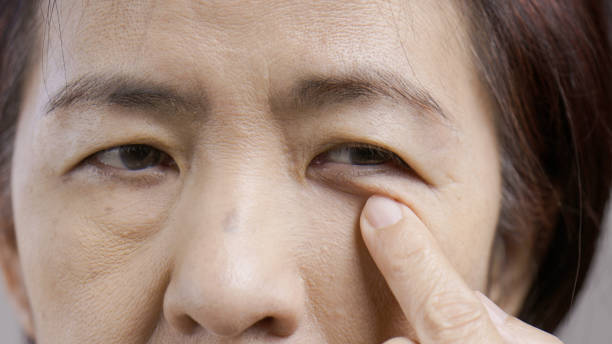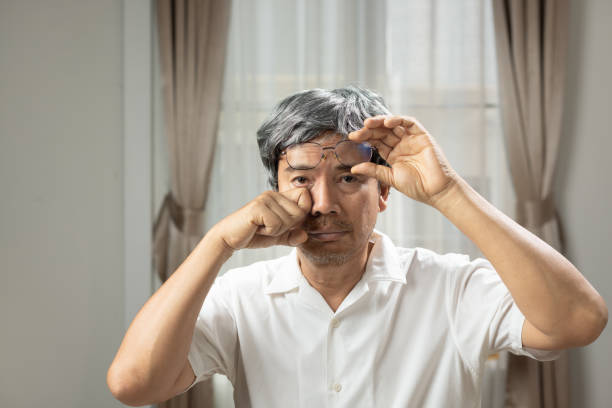Eye twitching, medically known as myokymia, is a common and generally harmless condition that many people experience at some point in their lives. This involuntary, repetitive spasm or contraction of the eyelid muscles can occur in one or both eyes and usually resolves on its own without treatment.
While often benign, eye twitching can occasionally be bothersome or persistent, prompting individuals to seek ways to alleviate or understand its underlying causes. Understanding the triggers, potential associations with stress or fatigue, and when to seek medical advice can help manage this common ocular phenomenon effectively.
Table of Contents
Types of Eye Twitching
Eye twitching, or myokymia, can manifest in several forms, ranging from benign and temporary to more persistent and severe. Here are the main types of eye twitching:
1. Minor Eyelid Twitch (Myokymia)
- Description: This is the most common type of eye twitching, involving mild, involuntary spasms of the eyelid muscles. It usually affects only one eye.
- Duration: Episodes are typically brief, lasting a few seconds to minutes, but can recur over days or weeks.
- Causes: Often linked to stress, fatigue, caffeine intake, or eye strain.
2. Benign Essential Blepharospasm
- Description: A more severe form of eye twitching that involves both eyes and results in frequent, forceful blinking or closure of the eyelids.
- Duration: Symptoms can become chronic and progressively worsen over time.
- Causes: The exact cause is unknown, but it may be associated with abnormalities in the basal ganglia of the brain, and can be exacerbated by stress, fatigue, or irritants.
- Treatment: May require medical interventions such as Botox injections, medications, or, in severe cases, surgery.
3. Hemifacial Spasm
- Description: A rare type of twitching that involves the muscles on one side of the face, including the eyelid. It can cause involuntary contractions of the entire half of the face.
- Duration: Persistent and often progressive, this condition requires medical evaluation.
- Causes: Usually caused by irritation or compression of the facial nerve, often by a blood vessel or a tumor.
- Treatment: May include Botox injections, medications, or surgery to relieve nerve compression.
4. Secondary Myokymia
- Description: Eye twitching that occurs as a result of an underlying neurological condition or systemic illness.
- Causes: Conditions such as multiple sclerosis, Parkinson’s disease, or brainstem lesions.
- Treatment: Focuses on addressing the underlying condition and may involve medications or other therapies.
5. Refractive Errors and Dry Eyes
- Description: Eye twitching can be a symptom of uncorrected refractive errors (such as myopia or hyperopia) or dry eyes.
- Causes: Straining to see clearly or insufficient tear production can lead to eye muscle fatigue and twitching.
- Treatment: Corrective lenses, artificial tears, and proper eye care can help alleviate symptoms.
6. Stress and Fatigue-Induced Twitching
- Description: Eye twitching that is primarily triggered by stress and fatigue, often linked to lifestyle factors.
- Causes: Lack of sleep, high stress levels, excessive caffeine or alcohol consumption.
- Treatment: Improving sleep hygiene, reducing stress, and moderating caffeine and alcohol intake can help.
7. Nutritional Deficiencies
- Description: Certain deficiencies, such as magnesium deficiency, can cause muscle spasms and eye twitching.
- Causes: Poor diet or malabsorption issues.
- Treatment: Dietary adjustments or supplements to correct the deficiency.
8. Medication Side Effects
- Description: Some medications can cause eye twitching as a side effect.
- Causes: Stimulants, certain diuretics, and medications used to treat psychiatric or neurological conditions.
- Treatment: Consulting with a healthcare provider to adjust medication if necessary.
Understanding the different types of eye twitching and their potential causes can help in identifying the appropriate management and treatment strategies. While most cases are benign and self-limiting, persistent or severe symptoms warrant medical attention to rule out underlying conditions and receive appropriate care.
Causes of Eye Twitching (Myokymia)

Eye twitching, medically referred to as myokymia, can be attributed to several factors, ranging from benign triggers to more serious underlying conditions. Here are the primary causes associated with eye twitching:
- Stress and Fatigue:
- Description: Stress and fatigue are common triggers for eye twitching. When the body is under stress or fatigue, it can affect the nervous system and lead to muscle spasms, including those in the eyelids.
- Management: Managing stress through relaxation techniques, adequate sleep, and reducing workload can help alleviate symptoms.
- Eye Strain:
- Description: Prolonged use of digital screens, reading, or focusing on close-up tasks can strain the eye muscles and lead to twitching.
- Management: Taking breaks, practicing the 20-20-20 rule (every 20 minutes, look at something 20 feet away for 20 seconds), and ensuring proper lighting and ergonomics can reduce strain.
- Caffeine and Alcohol:
- Description: Excessive consumption of caffeine or alcohol can stimulate the nervous system and trigger eye twitching.
- Management: Moderating intake or avoiding these substances can help alleviate symptoms.
- Fatigue and Sleep Deprivation:
- Description: Lack of sleep or irregular sleep patterns can contribute to muscle fatigue and twitching.
- Management: Establishing a regular sleep schedule and improving sleep hygiene can reduce eye twitching caused by fatigue.
- Dry Eyes:
- Description: Insufficient tear production or poor quality tears can irritate the eyes and lead to twitching.
- Management: Using artificial tears, maintaining proper humidity levels, and blinking regularly can help keep the eyes lubricated.
- Nutritional Deficiencies:
- Description: Deficiencies in certain vitamins and minerals, such as magnesium, can contribute to muscle spasms and eye twitching.
- Management: Eating a balanced diet rich in fruits, vegetables, and magnesium-containing foods (such as nuts, seeds, and leafy greens) or taking supplements as advised by a healthcare provider can help.
- Allergies:
- Description: Allergic reactions, particularly those affecting the eyes (allergic conjunctivitis), can cause irritation and twitching.
- Management: Identifying and avoiding allergens, using allergy medications or eye drops prescribed by a doctor, and practicing good eye hygiene can alleviate symptoms.
- Medications:
- Description: Certain medications, such as stimulants, antihistamines, and medications used to treat psychiatric or neurological conditions, can cause side effects like eye twitching.
- Management: Consulting with a healthcare provider to adjust medications or manage side effects appropriately.
- Caffeine Withdrawal:
- Description: Abruptly reducing or stopping caffeine consumption can lead to withdrawal symptoms, including eye twitching.
- Management: Gradually reducing caffeine intake or substituting with lower-caffeine alternatives can help manage withdrawal symptoms.
- Underlying Health Conditions:
- Description: In rare cases, eye twitching can be a symptom of underlying neurological disorders (such as multiple sclerosis), nerve damage, or structural abnormalities.
- Management: Seeking medical evaluation if twitching is persistent, severe, or accompanied by other neurological symptoms can help diagnose and treat underlying conditions.
Understanding these potential causes of eye twitching can aid in identifying triggers and implementing appropriate management strategies. While most cases of eye twitching are benign and self-limiting, persistent or severe symptoms should prompt consultation with a healthcare professional for further evaluation and guidance.
Symptoms of Eye Twitching (Myokymia)

Eye twitching, or myokymia, typically presents with specific characteristics that can vary in frequency and intensity. Here are the key symptoms associated with eye twitching:
- Involuntary Eyelid Spasms:
- Description: The primary symptom of eye twitching is involuntary contractions or spasms of the eyelid muscles.
- Location: It usually affects the lower eyelid of one eye, but can also involve the upper eyelid or both eyes simultaneously.
- Intermittent Twitching:
- Description: Eye twitching episodes are often intermittent, occurring sporadically throughout the day.
- Duration: Each twitching episode typically lasts for a few seconds to a few minutes, although some episodes may be shorter or longer.
- Mild Sensation:
- Description: Many individuals describe a mild sensation associated with eye twitching, such as a fluttering or pulsating feeling in the eyelid.
- Visible Twitching:
- Description: In some cases, the twitching of the eyelid is visible to others, especially if the spasms are frequent or pronounced.
- Triggered by Stimuli:
- Description: Eye twitching can be triggered or exacerbated by various factors, such as stress, fatigue, caffeine consumption, or eye strain from prolonged use of digital screens.
- No Pain or Discomfort:
- Description: In most cases, eye twitching is not painful and does not cause discomfort beyond the sensation of the twitch itself.
- Unilateral or Bilateral:
- Description: Eye twitching can affect one eye (unilateral) or both eyes (bilateral), depending on the underlying cause and individual factors.
- Not Associated with Vision Changes:
- Description: Eye twitching typically does not affect vision or cause changes in visual acuity. It remains isolated to the eyelid muscles.
- Progression to More Severe Forms:
- Description: In rare instances, persistent or severe eye twitching may progress to conditions like benign essential blepharospasm or hemifacial spasm, characterized by more frequent and forceful eyelid movements.
- Impact on Quality of Life:
- Description: While generally benign, frequent or prolonged eye twitching can impact daily activities and quality of life, prompting individuals to seek management strategies for relief.
Recognizing these symptoms can help individuals and healthcare providers better understand and manage eye twitching, ensuring appropriate interventions and alleviation of any associated discomfort or inconvenience.
Treatment Options for Eye Twitching (Myokymia)

Treatment for eye twitching, or myokymia, depends on the underlying cause and severity of symptoms. Most cases of eye twitching are benign and self-limiting, requiring minimal intervention. Here are various treatment options that can help alleviate symptoms:
Lifestyle and Self-Care Measures
- Reduce Stress and Fatigue:
- Managing stress through relaxation techniques such as deep breathing, meditation, or yoga can help reduce eye twitching triggered by stress.
- Improve Sleep Habits:
- Ensuring adequate sleep and establishing a regular sleep schedule can minimize fatigue-related eye twitching.
- Limit Caffeine and Alcohol:
- Moderating or avoiding excessive consumption of caffeine and alcohol can reduce stimulant-induced eye twitching.
- Eye Hygiene:
- Practicing good eye hygiene, including blinking regularly and taking breaks from prolonged screen use, can alleviate eye strain-related twitching.
- Nutritional Support:
- Maintaining a balanced diet rich in magnesium and other essential nutrients can help prevent nutritional deficiencies that contribute to muscle spasms.
Eye Care Practices
- Warm Compress:
- Applying a warm compress to the affected eye can help relax the eyelid muscles and reduce twitching.
- Eye Drops:
- Using lubricating eye drops (artificial tears) can help relieve dry eyes, which may contribute to eye twitching.
Medical Interventions
- Botulinum Toxin (Botox) Injections:
- In cases of severe or persistent eye twitching (benign essential blepharospasm), injections of botulinum toxin into the affected muscles can temporarily paralyze them and reduce spasms.
- Medications:
- Muscle Relaxants: In some cases, medications that relax muscles, such as benzodiazepines or anticonvulsants, may be prescribed to alleviate severe or chronic twitching.
- Antihistamines: If allergies are contributing to eye irritation and twitching, antihistamine eye drops or oral medications may be recommended.
- Surgery:
- In rare cases of severe blepharospasm or hemifacial spasm that do not respond to other treatments, surgical procedures to adjust nerve pathways or relieve nerve compression may be considered.
Alternative Therapies
- Acupuncture and Acupressure:
- Some individuals find relief from eye twitching through acupuncture or acupressure sessions, which aim to rebalance energy flow and relax muscles.
- Stress Management Techniques:
- Practices such as biofeedback, cognitive behavioral therapy (CBT), or hypnosis can help manage stress and reduce eye twitching.
Professional Guidance
- Consultation with an Ophthalmologist or Neurologist:
- For persistent or severe cases of eye twitching, seeking evaluation and guidance from a healthcare professional specializing in eye disorders or neurology is recommended.
- Monitoring and Follow-Up:
- Regular monitoring of symptoms and adjustments to treatment plans may be necessary to effectively manage chronic or recurring eye twitching.
It’s important to discuss any concerns or persistent symptoms with a healthcare provider to determine the appropriate course of treatment tailored to individual needs and underlying causes of eye twitching.
When to Speak With a Healthcare Professional
It’s essential to speak with a healthcare professional if you experience any of the following concerning signs or symptoms associated with eye twitching (myokymia):
- Persistent Twitching: If the eye twitching persists for more than a week or becomes frequent and bothersome despite attempts to alleviate it through self-care measures.
- Severe Twitching: If the twitching is severe enough to cause complete closure or significant discomfort of the eyelid.
- Bilateral Twitching: If both eyes are affected simultaneously by twitching episodes.
- Vision Changes: If the eye twitching is accompanied by changes in vision, such as blurred vision, double vision, or difficulty focusing.
- Other Facial Spasms: If you experience additional facial spasms beyond the eyelid, such as twitching in other facial muscles or involuntary movements.
- Pain or Discomfort: If the eye twitching is painful, causes significant discomfort, or is associated with redness or swelling of the eyelid.
- Impact on Daily Activities: If the eye twitching interferes with daily activities, such as reading, driving, or working on a computer.
- Underlying Medical Conditions: If you have a history of neurological disorders, such as multiple sclerosis, or if you suspect the eye twitching may be related to another underlying medical condition.
- Medication Side Effects: If you suspect that medications you are taking may be contributing to the eye twitching as a side effect.
- Concerns about Blepharospasm or Hemifacial Spasm: If you suspect that the eye twitching may be progressing to conditions like benign essential blepharospasm or hemifacial spasm, characterized by more severe and frequent spasms.
Speaking with a healthcare professional, such as an ophthalmologist or a neurologist, can help determine the underlying cause of the eye twitching and guide appropriate treatment or management strategies. Early intervention can often alleviate symptoms and prevent potential complications associated with more severe forms of eye twitching.
Conclusion
In conclusion, eye twitching, or myokymia, is a common and usually benign condition characterized by involuntary spasms of the eyelid muscles. While often temporary and harmless, persistent or severe twitching may warrant medical attention to rule out underlying causes or conditions. Understanding the triggers, such as stress, fatigue, and eye strain, can help manage and alleviate symptoms through lifestyle adjustments and self-care measures.
If eye twitching becomes frequent, severe, or is accompanied by other concerning symptoms like vision changes or pain, consulting a healthcare professional is recommended for proper evaluation and personalized treatment. Early intervention can lead to effective management and improved quality of life for individuals experiencing eye twitching.
